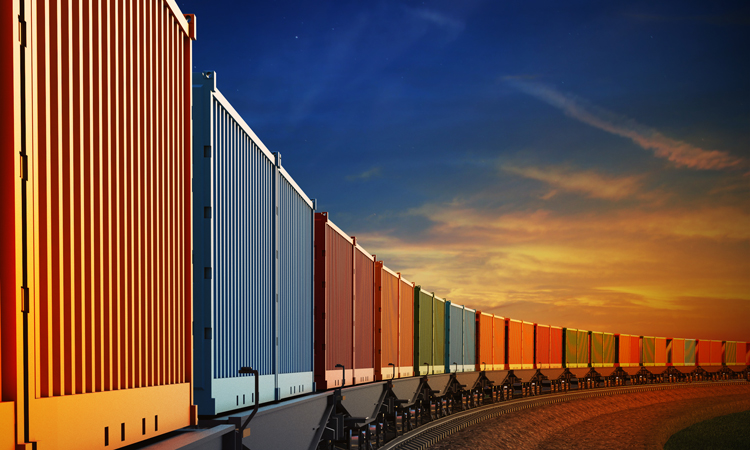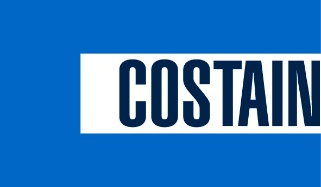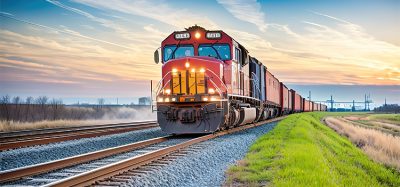ERFA calls for fair, transparent and non-discriminatory support measures for rail freight
Posted: 2 November 2020 | Global Railway Review | No comments yet
With a second wave of the COVID-19 pandemic now spreading across Europe, ERFA has called for better support for the rail freight industry.


The question of how best to support the rail freight industry through the ongoing COVID-19 pandemic in a fair, transparent and non-discriminatory manner remains one of the most pressing issues facing the sector. This topic has been brought back to the fore due to the second wave of the pandemic currently taking hold throughout Europe.
The European Rail Freight Association (ERFA) has called on the European Commission (EC) and its Member States to ensure that support measures, which are desperately needed, do not lead to avoidable competition distortion and damage to the industry as a whole.
The European rail freight industry today is a dynamic market made up of a large number of actors. On average, in Europe, new entrants account for 44 per cent of national market shares of rail freight undertakings based on net-tonne kilometre. On top of this, 31 per cent of all rail freight undertakings are non-incumbent operators, meaning that they are not an incumbent operator in any European country.
It is important to stress that this market opening is still moving in the correct direction. The average percentage of new entrants increased from 40 per cent in 2016 to 44 per cent in 2018. This growth is fragile, however, given that new entrants, particularly non-incumbent operators (which are the majority of new entrants), require legal certainty – particularly regarding State Aid – in order to be able to continue to invest and grow.
It is crucial that the development of a legal framework that ensures that support measures can only be introduced where they are fair, transparent and available to all actors continues. Any deviations from these principles will lead to investment uncertainty and, subsequently, undermine the entire industry’s ability to play its role in bringing freight transport emissions under control.
ERFA’s support proposals
In light of this, and taking into consideration the continuing COVID-19 pandemic, the European Rail Freight Association has called for:
Non-discriminatory support measures
Aid should only be admissible where it is fair, transparent and non-discriminatory.
Bilateral support measures, either directly or through cross-subsidisation, have the potential to distort competition and damage existing markets
Continued monitoring and updating of State Aid Temporary Framework
ERFA has welcomed the European Commission’s State Aid Temporary Framework. This has provided Member States with flexibility to support key industries when and where required.
This framework must remain a temporary measure and continue to be adapted to the needs of European economies.
The European Commission should continue to assess and amend the provisions of the temporary framework based on the key principle that all aid allocated under the framework must be non-discriminatory.
Reduction and waiving of track access charges
ERFA has welcomed the recent adoption of a regulation establishing measures for a sustainable rail market in view of the COVID-19 outbreak.
This regulation gives Member States the freedom to waive and reduce track access charges. This remains the best way to support the rail freight sector in a fair and proportional manner.
ERFA strongly calls on Member States to take concrete actions in line with this regulation.
Creation of a freight transport crisis contingency plan
The European Commission has already come forward with a communication upgrading the transport Green Lanes.
In order to ensure rail freight continues to operate as the backbone of freight logistics, the European institutions and Member States should move quickly on implementing the provisions of this communication and the creation of a wider Freight Transport Crisis Contingency Plan.
This should ensure that, regardless of how the pandemic develops, cross-border freight operations along TEN-T corridors and other essential routes are protected and that transport workers can continue to move across borders. It must also ensure that terminals and other essential auxiliary services can continue to operate.
Rail freight in the Green Deal
Furthermore, the critical function of rail freight in the present COVID-19 crisis must to be sustained and perpetuated in view of the Green Deal objectives. Lessons learnt from the crisis should be used to create a stronger rail freight system.
President of the European Rail Freight Association, Dirk Stahl, said: “All actors in the rail freight market have been impacted by the continuing COVID-19 pandemic. We believe that support measures for the sector as a whole are crucial, but we need to ensure that these measures do not undermine competition. For private and independent operators, this is essential if we are to be in a position to continue to grow. Crucially, we also need to continue to ensure that rail freight continues to move across national borders regardless of how the pandemic evolves over the coming weeks and months.”
Conor Feighan, ERFA’s Secretary General, said: “It is essential that Member States take a proactive approach to supporting the rail freight sector and look at proactive options, such as a waiving of track access charges. This will ensure that all undertakings are supported in an equal manner and, subsequently, ensure that rail freight can continue to become more competitive throughout and beyond the pandemic.”
Related topics
Cargo, Freight & Heavy-Haul, Coronavirus/COVID-19, Operational Performance, Regulation & Legislation, The Supply Chain, The Workforce






